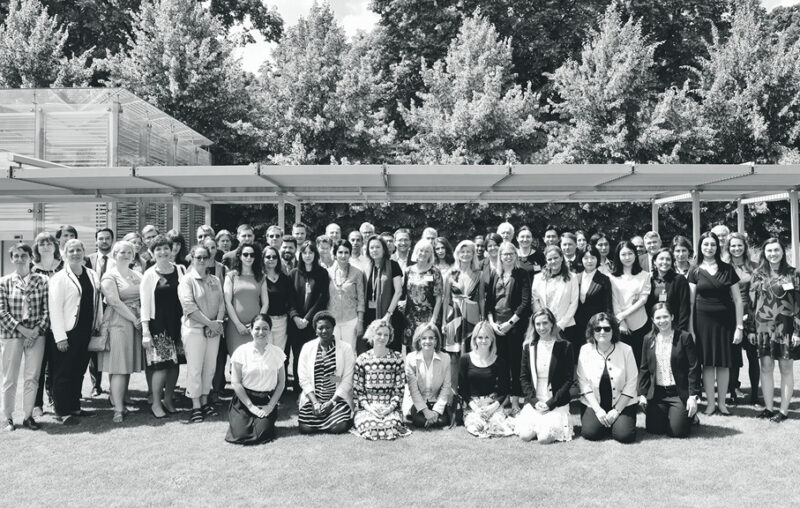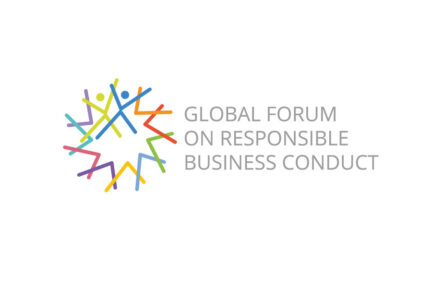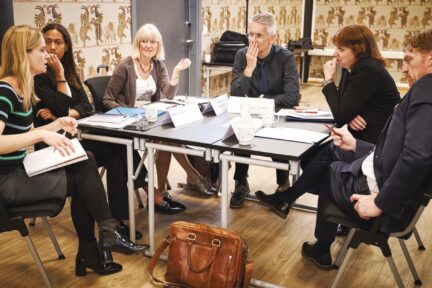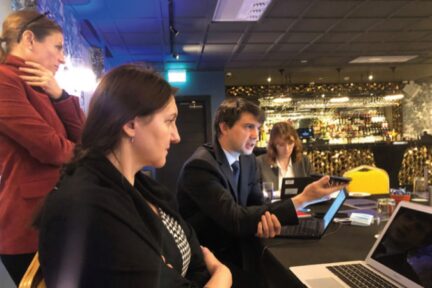International cooperation
The third aspect of the NCP’s work is to cooperate and share best practice with the OECD and the 50 other National Contact Points.
For the contact point system to gain trust, it is essential that multinational enterprises are subject to the same requirements and expectations regardless of which OECD country they are based in.
The NCPs are organised differently, however, and their resources and status also vary, which challenges this principle.
Participation in international meetings

One of the NCP’s important tasks is to cooperate with the 50 OECD National Contact Points in other countries, and to participate in the OECD Forum and meetings on responsible business conduct. These meetings were held online in 2021 due to the coronavirus pandemic. The NCP nonetheless had the pleasure of attending several international events.

Record participation
Leading representatives of business and industry, academia, trade unions, civil society and governments come together at the Forum to share best practices and new developments in responsible business conduct. The Forum was held online in June 2021, with a record number of more than 2,500 participants.
The key topic at the year’s Forum was how responsible business conduct can be the key to a sustainable future in a world that is constantly changing. A range of enterprises shared best practices from their work on due diligence. Several sessions were held on the NCPs’ work, where Head of the Secretariat Cathrine Halsaa led a session on the NCPs’ role in promoting responsible business conduct.

Well established network
The Nordic and Baltic NCPs meet every year under the Nordic-Baltic NCP network. In 2021, the Danish NCP hosted this conference, which had to be held online due to the coronavirus pandemic.
The group has evolved to be a trust-based forum for raising specific issues, such as the best way of giving advice to businesses about due diligence, and methods for successfully handling specific instances.
The topic of this year’s meeting was experience of handling specific instances during the coronavirus pandemic, with a particular focus on the advantages and disadvantages of online mediation. Belgium’s NCP gave an account of its experience of the online mediation process. International developments in statutory due diligence, by way of national and international regulation, were also discussed. Norway’s NCP presented its survey of Norwegian enterprises’ knowledge of the OECD Guidelines and the NCP, discussed in its 2020 annual report.
____________
Photo:
PHYSICAL MEETING: From the left Barbara Bijelic representing the OECD, Cecilie Meciah Haugen Ngwenya and Linda Nielsen representing Denmark’s NCP, Henning Kloster-Jensen representing the Norwegian Ministry of Foreign Affairs, Cathrine Halsaa representing Norway’s NCP and Jakob Kiefer representing the Swedish Ministry of Foreign Affairs. Photo taken at the meeting in 2019.

Important learning tool
Peer reviews of the individual NCPs are an important resource in establishing functional equality between them. In autumn 2021, NCP member Beate Ekeløve-Slydal and Åse Sand from the secretariat participated in the peer review team that assessed Ireland’s NCP. The Spanish and Czech NCPs were also represented on the team, together with representatives of the OECD Secretariat. They met Ireland’s NCP and its stakeholders on 27 and 28 October 2021 in Dublin.
During the peer review, the team assesses how the NCP works, and whether it operates in accordance with the core criteria for the NCP system, i.e. visibility, accessibility, transparency and accountability. The team also looks at whether the NCP’s handling of specific instances is impartial, predictable, fair and in compliance with the OECD Guidelines.
The peer review process is an important learning tool for the NCP being reviewed, but it is also a very interesting and educational process for the NCPs represented on the team
___________
Photo:
PEER REVIEW: The peer review team speak to different stakeholders during the process, here on the phone to a party to a complaint relating to DR Congo. From the left: Aize Azqueta representing Spain’s NCP, Ludmila Hyklova representing the Czech Republic’s NCP, and Nicolas Hachez and Emily Halstead representing the OECD Secretariat.
Updating the OECD Guidelines?

In 2021, the OECD initiated a process to ensure the Guidelines continue to be the leading standard for responsible business conduct. The objective of this stocktaking process is to map recent developments relating to responsible business conduct, the most important goals achieved, challenges for the Guidelines and the unique grievance mechanism the NCP system represents, in addition to the international context the Guidelines operate in.
The process has been subject to international open consultation, with input from a range of actors, also from Norway, including organisations representing the social partners, civil society and international organisations such as ILO, the UN and the Global Alliance of National Human Rights Institutions (GANHRI).
This work has enabled the OECD to map the strengths of the Guidelines and the NCP system, and challenges and shortcomings in relation to international developments and the potential for improvement.
Three topics have stood out in particular in the process:
- Are the Guidelines fit for the issues in all areas of responsible business conduct?
- Is the NCP system institutionally fit to
promote the Guidelines and handle complaints? - Are the Guidelines and the OECD Working Party on Responsible Business Conduct (WPRBC) fit for implementation at the centre of international developments in responsible business conduct?
The process will continue throughout 2022.

